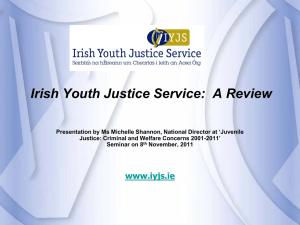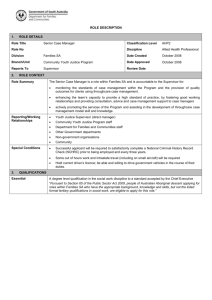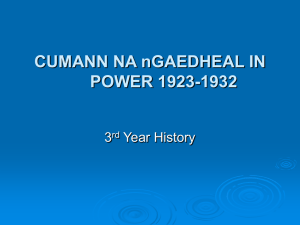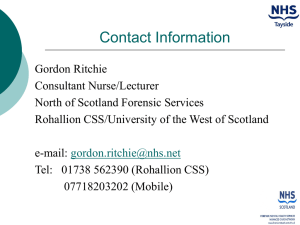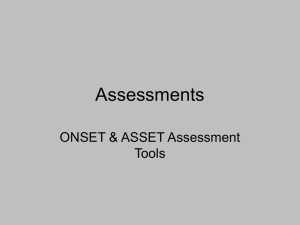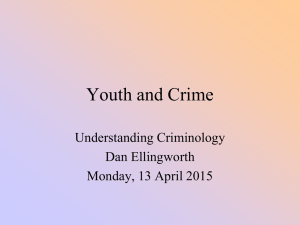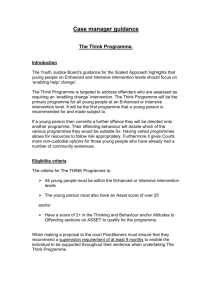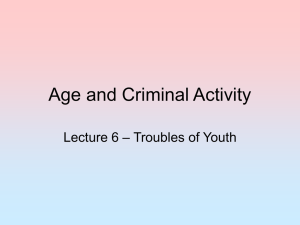Sue Redmond - Irish Youth Justice Service
advertisement
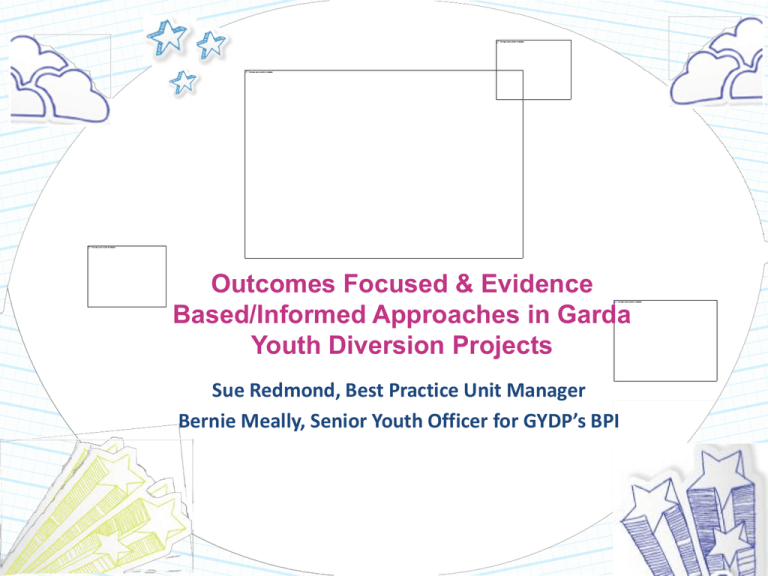
Outcomes Focused & Evidence Based/Informed Approaches in Garda Youth Diversion Projects Sue Redmond, Best Practice Unit Manager Bernie Meally, Senior Youth Officer for GYDP’s BPI Agenda • • • • • • • Background Outcomes Focus Evidence-based/informed practice Changing Habits & Reaching Targets GYDP-BPI A Life of Choices Evaluation Training Background • Foróige • The Atlantic Philanthropies • The Best Practice Unit Outcomes Focus What do we want? Logic Model Conversation -Process & Outcomes Evidence Based/Informed • • • • • • • • Literature reviews Conceptual models Theoretical underpinning Educational theorists Adolescent Development Risk & Needs Assessment Logic Model Evaluation Influencing the Wider Sector • • • • • Department of Children & Youth Affairs Irish Youth Justice Service National Youth Council of Ireland National University of Ireland, Galway Outcomes Focused Service Design CHART CHART Changing Habits And Reaching Targets • • • • • • • • • • Cognitive Behavioural 1-1 tool 15-20 minute sessions Based on Principles of Effective Interventions & “What Works” Focus on offending behaviour User-friendly Age-appropriate Linked to Case Management and Risk Assessment Structured 6 core modules, 6 discretionary modules Certificate on completion of core & discretionary Modules Core Modules Elective Modules Introduction (1) Module 1: Offence Mapping (2) Module 2: Motivation to Change (3) Module 3: Offending Thinking (2) Module 4: Problem Solving (3) Module 5: Lifestyle Balance (3) Module 6: Relapse Prevention Plan (1) Two sessions for each discretionary module Module 7: Healthy Relationships Module 8: Violence Module 9: Motor Vehicle Offending Module 10: Drugs & Alcohol Module 11: Living Independently Module 12: Education and Work 10 A Life of Choices BBBS-JUMP ‘Sharing the load’ ‘Someone to lean on’ GYDP Best Practice Initiative • Partnership between Irish Youth Justice Service and Foróige with support from An Garda Síochána • Part of the IYJS change programme in line with the National Youth Justice Strategy (20082010) and the baseline analysis of GYDP’s • Aims to develop and support best practice across the network of 102 GYDP’s • Mix of training, consultancy, Trial site support... Trial Sites • Develop an Irish service model for the best possible outcomes for young people involved in offending behaviour • 14 sites in total, 5 in 2009/2010 and 9 in 2011 • Tailored to particular strengths & needs • Analysis of youth crime, identification of outcomes, development of appropriate responses & targeting • Team approach • Facilitated meetings, intelligence from An Garda Síochána, exploration of relevant research literature & Outcomes Focused Programme Design Training (Logic model) Evaluation • • • • • • Focus groups Process and outcomes evaluated Tailor made so experiences were different Key themes Predominantly positive Areas for consideration highlighted Clearer Outcomes & Increased Focus • Based on the youth crime analysis • Greater insight into needs and issues • Outcomes based on behaviour’s and circumstances in medium term • More focused and effective interventions • Improved targeting • Better outcomes for participants Improved Co-operation Team approach resulted in: • Improved relationships • More focused discussions • Shared understanding • Decreased isolation Improved Evidence Ease • • • • Garda intelligence Local professional knowledge Research- local & international Positive learning experience Improved ability to articulate what we do & why we do it • Increased honesty with young people, families, the community and selves • Challenged to articulate positions and justify decisions through process • Reflect critically on past practices • Recognition of capabilities and limitations • Will improve perceptions of GYDP in community Change in project activities • In some cases a complete restructuring • Shift of focus from one area to another Sense of achievement, increased confidence, renewed enthusiasm & motivation Time • Significant amount of time • Essential to make space • But time well spent Trial Site Process Informed Developments for all GYDP’s • Focus on evidence based/informed practice • Planning for Success tutorials • Outcomes Focused Programme Design (Logic Model) Training for all GYDP’s • Outcomes Focused Annual Planning • Improvement in number of exemplary Annual plans A Life of Choices A resource for GYDP’s which enables facilitators to explore crime and offending behaviour with young people with the aim of equipping participants with the knowledge and skills to engage in pro-social behaviour, make positive life choices and ultimately reduce the level/frequency of their offending. Theories underpinning A life of Choices • • • • Cognitive Behavioural Theory Motivational Interviewing Experiential learning Transtheoretical Model of Change Participant Outcomes By the end of the programme participants will display: • Enhanced social skills and communication skills • An appreciation for the influence of their peers • Enhanced ability to deal with their anger • Problem solving and conflict resolution skills • An understanding of their offending behaviour • Identification of their core values • Improved decision making • Motivation to change behaviour • Enhanced empathy and impulsivity control • An increase in pro-social behaviours • A reduction in pro-crime attitudes • An understanding of why the law exists Pre-manual Stage • Develop group contract • Establish group norms • Build relationships and trust Before use of A Life of Choices A Life of Choices Manual Framework A Life of Choices Manual Framework A Life of Choices Manual Framework Evaluation Training • Evaluation training carried out by NUIG • Qualitative and Quantitative tools to assess their work • Focus on Assessment tools • Staff carry out a pre and post assessment on a programme of their choosing To Consider • What informs/drives your work forward? • What do you do that is the same or different? • What benefits/challenges do you see from this approach?
